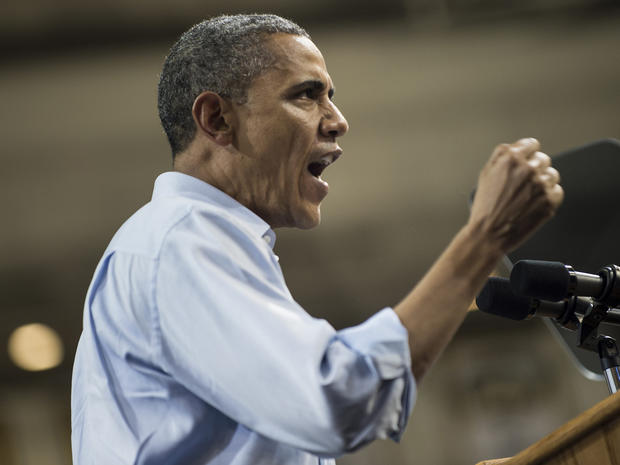Northern Virginia edge could be pivotal for Obama
This article originally appeared on RealClearPolitics.
Updated 11:40 a.m. ET
SPRINGFIELD, Va. -- For President Obama's organizational machine in Virginia, Tuesday's jam-packed statewide schedule was typical.
There was a voter registration drive outside a Bonnie Raitt concert in Charlottesville, an afternoon phone bank at the Hopewell library just south of Richmond, and a volunteer recruitment meeting at a private home in this distant suburb of Washington, D.C.
All told, the Obama campaign listed on its website 62 separate events throughout the Commonwealth that day.
Recent weeks have seen regular openings of new Obama field offices across Virginia (there are now 15), and the dozens of paid staffers working out of the campaign headquarters in Richmond and elsewhere around the state have become increasingly visible.
In what both sides regard as one of the election's three or four most critical swing states, Obama has opened up a slim yet significant three-point lead in the latest RCP average of Virginia polls. Though he shows strength in other regions of the state, the president largely has the expansive D.C. suburbs to thank for that advantage.
In Fairfax, the Old Dominion's most populous county, Obama bested John McCain by 61 percent to 39 percent in his seven-point Virginia victory in 2008. While he may not have to win the county by that wide a margin this time around, he is counting on Northern Virginia's increasing diversity and its large federal workforce to provide a critical edge once again.
"The economic influence of the federal government is probably outsized here," said Rep. Gerry Connolly, a Democrat who represents Virginia's suburban 11th District, where residents are among the wealthiest in the nation. "We [also] look a lot more like the face of the country as a whole than ever before, and what's interesting about that is it tends to favor Democratic candidates."
Anyone passing through Northern Virginia over the last few years has noticed an increase in Asian and Hispanic restaurants and other minority-owned businesses that compete for space with the McMansions. Also apparent is the tangled web of freeways that connect -- and symbolize -- the sprawl that keeps extending farther and farther beyond the nation's capital.
The dramatic influx of minorities and out-of-state transplants who lack any cultural identification with the Old South amounts to one of the most problematic demographic shifts for the Republican Party's presidential prospects here.
Depending on where the borders are drawn, Northern Virginia contains about one-third of the state's population (the Romney campaign argues that it is 28 percent), a share that has become even more diverse in the four years since Obama earned the first victory for a Democratic presidential candidate since 1964.
Though Mitt Romney visited Northern Virginia last month and has tentative plans to return for a fundraiser toward the end of June, the failure of his major Republican primary opponents to get on the state ballot earlier this year meant that he never had to campaign here during his nomination fight.
While the Romney campaign now has a small presence on the ground, at its lone statewide office -- in Metro-accessible Arlington -- fresh-faced interns far outnumbered paid staffers on Tuesday.
The campaign largely outsourced its Virginia ground operation to the Romney Victory Fund (a joint committee shared with the national Republican Party), which maintains nine offices throughout the commonwealth. Romney aides suggest that the coordinated effort is an advantage, since the campaign does not have to compete for volunteers and other resources with the Republican committees.
But Romney aides assert that they are not as far behind organizationally as they appear to be.
While the campaign has not yet started competing with Obama's TV advertising in Washington (the media market that includes Northern Virginia), the presumptive Republican nominee has been getting significant coverage thanks to Karl Rove's Crossroads GPS advocacy group.
Furthermore, Virginia Republicans point to statewide gains they have made since Bob McDonnell was elected in governor 2009 with the help of a new voter-turnout model, particularly in the D.C. suburbs.
And then there's the presumptive nominee himself. "Governor Romney has a lot of qualities that voters across Virginia and in Northern Virginia [in particular] will respect and find appealing, [especially] his business background and the fact that he has a proven record of job creation," said the state's Romney Victory director, Dave Rexrode. "Obviously, Northern Virginia is one of the larger economic engines in the state."
George Allen, who won the Republican Senate nomination in Virginia on Tuesday, has thus far offered only mild public support for Romney, though their electoral fates may be intertwined.
As primary voters trickled into Orange Hunt Elementary School in Springfield on Tuesday morning at an hourly rate that could barely field a soccer team, Allen finally exited the passenger-side seat of his Ford Explorer. Finding no more than a couple voters to shake hands with, he took questions from two reporters.
Asked how he and Romney could make Northern Virginia more competitive in November than it was in the last presidential cycle, Allen smiled.
"What's your suggestion?" he asked rhetorically.
The former governor and U.S. senator pointed out that he and his wife, Susan, live in Fairfax County and therefore identified with the stress of Northern Virginia traffic congestion, which is arguably the worst in the nation.
The man who is trying to reclaim the Senate seat he lost in 2006 did not attempt to sugarcoat, however, the challenge that the region will pose to him and Romney in November.
"This is where most of the votes are, and we need to do better than last time," he said.

